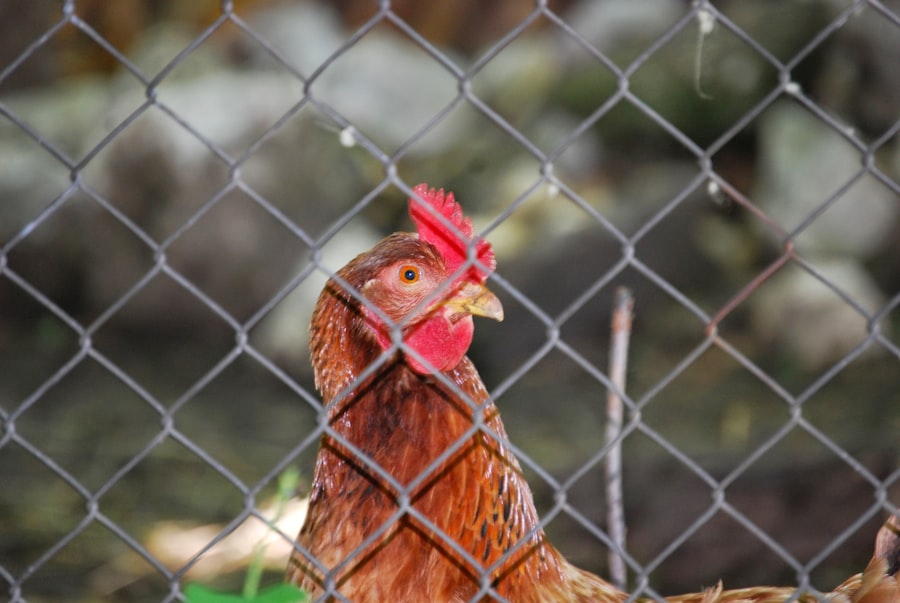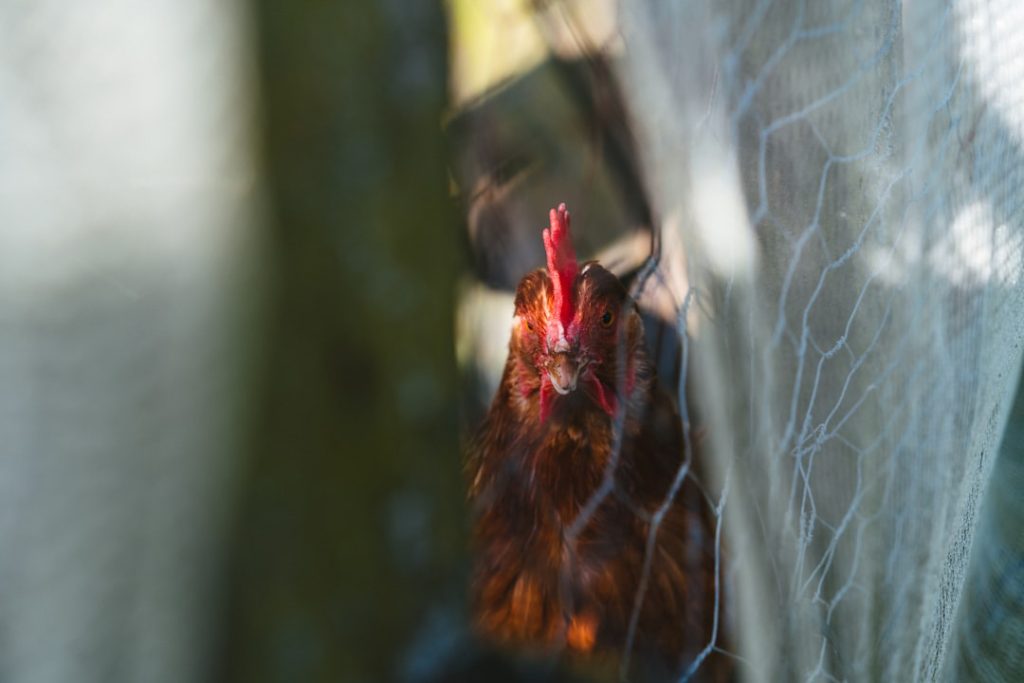Free range chickens exhibit natural behaviors that can lead them to explore beyond their designated areas. These birds are inherently curious and have a strong instinct to forage for food, which may result in them entering neighboring properties. Chickens are social creatures that often follow a dominant member of their flock.
They are attracted to areas with plentiful food sources, including gardens, compost heaps, and unsecured trash containers. Chickens can also display territorial behavior and may become aggressive if they feel threatened or consider an area part of their domain. Free range chickens possess the ability to fly short distances and navigate through small openings, making containment challenging.
Their inquisitive nature drives them to investigate new objects or structures in their surroundings, which can render traditional deterrents less effective. Understanding these behavioral traits is essential for developing strategies to manage free range chickens and prevent them from entering unwanted areas.
Table of Contents
- 1 Creating physical barriers to keep chickens out
- 2 Using natural deterrents to discourage chickens from entering your property
- 3 Implementing scare tactics to keep chickens away
- 4 Providing alternative food sources to divert chickens away from your property
- 5 Working with neighbors to address the issue of free range chickens
- 6 Seeking legal recourse if free range chickens continue to be a problem
- 7 FAQs
- 7.1 What are free range chickens?
- 7.2 Why would I want to keep free range chickens off my property?
- 7.3 How can I keep free range chickens off my property?
- 7.4 What are some natural deterrents for keeping free range chickens off my property?
- 7.5 Are there any legal considerations for keeping free range chickens off my property?
Key Takeaways
- Free range chickens are naturally curious and will explore their surroundings, often leading them to enter neighboring properties.
- Physical barriers such as fences and netting can be effective in keeping chickens out of specific areas.
- Natural deterrents like citrus peels, coffee grounds, and predator urine can help discourage chickens from entering your property.
- Scare tactics such as motion-activated sprinklers or noise-making devices can startle chickens and keep them away.
- Providing alternative food sources like bird feeders or designated feeding areas can divert chickens away from your property.
- Working with neighbors to address the issue of free range chickens can lead to a collaborative solution.
- If all else fails, seeking legal recourse may be necessary to address the problem of free range chickens on your property.
Creating physical barriers to keep chickens out
Fencing: A Sturdy Barrier
Creating physical barriers is an effective way to keep free-range chickens out of your property. Fencing is one of the most common and effective methods for keeping chickens away. A sturdy fence that is at least 6 feet tall can prevent chickens from easily accessing your property.
Securing the Fence
It’s important to ensure that the fence is buried at least a foot into the ground to prevent chickens from digging underneath it. Additionally, using wire mesh with small openings can prevent chickens from squeezing through or flying over the fence. Another option is to use electric fencing, which delivers a mild shock to deter chickens from attempting to cross the barrier.
Alternative Barriers
Another physical barrier that can be effective in keeping chickens out is the use of netting or bird spikes. Netting can be used to cover vulnerable areas such as gardens or fruit trees, preventing chickens from accessing these tempting food sources. Bird spikes can be installed on ledges or other flat surfaces where chickens may roost or perch, making it uncomfortable for them to land and discouraging them from staying on your property.
Using natural deterrents to discourage chickens from entering your property

In addition to physical barriers, natural deterrents can also be effective in discouraging free range chickens from entering your property. One natural deterrent is the use of predator decoys, such as fake owls or hawks. These decoys can create the illusion of a predator presence, which can scare off chickens and prevent them from entering your property.
It’s important to regularly move the decoys around to prevent chickens from becoming accustomed to their presence. Another natural deterrent is the use of strong scents or flavors that chickens find unpleasant. For example, spreading citrus peels or spraying vinegar around your property can deter chickens due to their aversion to these scents.
Additionally, planting certain herbs and flowers with strong odors, such as lavender or marigolds, can help repel chickens from your garden or other vulnerable areas.
Implementing scare tactics to keep chickens away
Scare tactics can be an effective way to keep free range chickens away from your property. One common scare tactic is the use of noise, such as clapping hands, banging pots, or using a whistle. Sudden loud noises can startle chickens and encourage them to leave the area.
Another scare tactic is the use of motion-activated devices, such as sprinklers or lights. These devices can startle chickens when they enter a specific area, making them less likely to return. Another scare tactic that can be effective is the use of visual deterrents, such as reflective surfaces or shiny objects.
Hanging CDs or aluminum foil strips in vulnerable areas can create flashes of light that deter chickens from approaching. Additionally, using scarecrows or other human-like figures can create the illusion of a human presence, which can scare off chickens.
Providing alternative food sources to divert chickens away from your property
One way to divert free range chickens away from your property is to provide alternative food sources for them. By offering a designated feeding area with grains or seeds, you can attract chickens away from vulnerable areas such as gardens or compost piles. This can help reduce the likelihood of chickens foraging on your property for food.
Another option is to plant cover crops or grassy areas specifically for chickens to forage in. By providing an alternative foraging area, you can encourage chickens to stay away from your garden or other sensitive areas. Additionally, providing access to fresh water sources can also help divert chickens away from your property, as they are attracted to areas with abundant water.
Working with neighbors to address the issue of free range chickens

Collaborative Problem-Solving
If free range chickens are a problem in your neighborhood, it may be beneficial to work with your neighbors to address the issue collectively. By communicating with your neighbors about the impact of free range chickens on your property, you can work together to find solutions that benefit everyone involved. This may include implementing shared physical barriers, such as fencing or netting, that can help keep chickens out of multiple properties.
Identifying the Source of the Problem
Collaborating with neighbors can help identify the source of the free range chickens and address the issue at its root. By working together to identify the owners of the chickens or the areas where they originate from, you can take collective action to address the problem more effectively.
Taking Collective Action
This may involve reaching out to local authorities or animal control agencies to address the issue and find a long-term solution. By working together, you can ensure that the problem is addressed in a way that benefits the entire community.
Seeking legal recourse if free range chickens continue to be a problem
If free range chickens continue to be a persistent problem despite your efforts to address it, seeking legal recourse may be necessary. Depending on local ordinances and regulations, there may be legal avenues available to address the issue of free range chickens on your property. This may include filing a complaint with local animal control authorities or seeking assistance from legal professionals who specialize in property rights and nuisance issues.
Additionally, if the free range chickens belong to a specific owner or neighbor, it may be necessary to pursue legal action to address the problem. This could involve sending a formal letter requesting that the owner contain their chickens or take measures to prevent them from entering your property. If necessary, legal action may be pursued through small claims court or other legal channels to seek compensation for damages caused by free range chickens.
In conclusion, understanding the behavior of free range chickens is essential in finding effective solutions to keep them away from your property. By creating physical barriers, using natural deterrents, implementing scare tactics, providing alternative food sources, working with neighbors, and seeking legal recourse if necessary, you can address the issue of free range chickens and protect your property from potential damage and nuisance.
If you’re looking for ways to keep free range chickens off your property, you may also be interested in learning about creative chicken coop interior ideas. Check out this article on poultrywizard.com for some inspiration on how to make your chicken coop a comfortable and functional space for your feathered friends.
FAQs
What are free range chickens?
Free range chickens are poultry that are allowed to roam freely and forage for food, as opposed to being confined to a coop or small enclosure.
Why would I want to keep free range chickens off my property?
There are several reasons why you might want to keep free range chickens off your property, including potential damage to gardens, landscaping, and property, as well as concerns about noise, waste, and potential disease transmission.
How can I keep free range chickens off my property?
There are several methods for keeping free range chickens off your property, including installing fencing or barriers, using repellents or deterrents, and working with neighbors or local authorities to address the issue.
What are some natural deterrents for keeping free range chickens off my property?
Natural deterrents for keeping free range chickens off your property can include planting certain types of vegetation that chickens dislike, such as prickly or thorny plants, as well as using natural scents or odors that chickens find unpleasant.
Are there any legal considerations for keeping free range chickens off my property?
The legal considerations for keeping free range chickens off your property can vary depending on your location and local regulations. It’s important to research and understand any relevant laws or ordinances before taking action.
Meet Walter, the feathered-friend fanatic of Florida! Nestled in the sunshine state, Walter struts through life with his feathered companions, clucking his way to happiness. With a coop that’s fancier than a five-star hotel, he’s the Don Juan of the chicken world. When he’s not teaching his hens to do the cha-cha, you’ll find him in a heated debate with his prized rooster, Sir Clucks-a-Lot. Walter’s poultry passion is no yolk; he’s the sunny-side-up guy you never knew you needed in your flock of friends!







